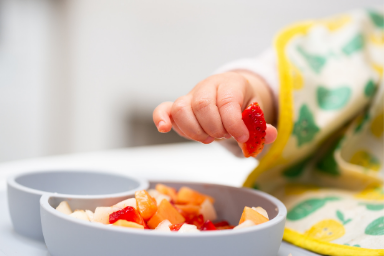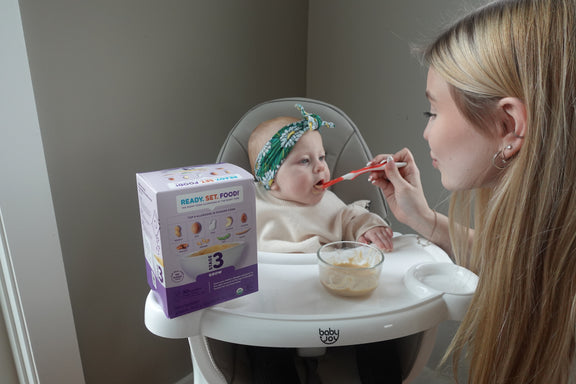If your child has a food allergy, keeping them safe from an allergic reaction means carefully reading food labels every time you purchase a packaged food product, to avoid their allergens.
Here’s what parents need to know about label reading and food allergies, including detailed lists of the ways top 9 allergens can commonly show up as food ingredients.
In this article, you'll learn about:
- Food allergen labeling laws
- What "May Contain" means on allergen labels
- Tips for label reading and safe shopping
- How to identify hidden allergens in packaged foods, by allergen
When your child has food allergies, grocery shopping can be challenging. You'll need to strictly avoid any products that contain your child's allergen(s).
This is because eating even a small amount of their allergen can cause your child to develop an allergic reaction (which could potentially become severe, or even life-threatening).
And sometimes, allergens can show up in packaged foods in unexpected ways.
Thus, keeping your child safe from an allergic reaction means carefully reading food labels every time you purchase a packaged food product.
Here's what parents need to know about label reading and food allergies, for safe shopping.
Food Allergen Labeling: What's Required By Law?
Label reading to avoid your child's allergen(s) can be challenging. Fortunately, certain U.S. laws require the top allergens to be clearly labeled on packaged food labels, whenever they are used as ingredients in a food.
The allergens that must be clearly labeled include:
- Milk
- Egg
- Peanut
- Tree nuts (ex. almonds, cashews, walnuts, pistachios)
- Wheat
- Soy
- Finned fish (ex. tuna, salmon, tilapia)
- Crustacean shellfish (ex. shrimp, crab, lobster)
The Food Allergen Labeling and Consumer Protection Act of 2004 (FALCPA) requires that these allergens are clearly labeled on a food in at least one of three ways:
- Under the ingredient list, using the wording "Contains [allergen]"
- Ex. Contains: Milk, Egg, Soy, Wheat
- Ex. Contains: Peanut
- Using the allergen's common name in the list of the ingredients
- If a less common name of an allergen is used in the ingredient list, and the allergen hasn't been called out in either of the above two ways, the manufacturer must follow the less common name with the common name of the allergen in parentheses.
- Ex. Whey (milk)
- Ex. Ovalbumin (egg)
- Ex. Edamame (soy)
Also, if a product contains a type of tree nut, finned fish, or crustacean shellfish, the specific type must be listed on the food label by law.
- Tree nut example: "Contains: Walnut"
- Tree nut example: “Contains tree nuts (Almond, Pecan)”
- Finned fish example: "Contains: Tuna"
- Crustacean shellfish example: "Contains: Shrimp"
A Note On Sesame: The FASTER Act will require sesame, the ninth top allergen, to be labeled in the same way as the other eight top allergens. But this regulation won't take effect until January 2023. If your child has a sesame allergy, you'll need to read food labels even more carefully in the meantime.
Learn more about identifying food allergens on labels from the FARE (Food Allergy Research and Education) Food For Thought Series:
Making Sense of "May Contain" Labels
You may also see "May contain [allergen]" labels, or labels that read "Processed on equipment that also processes [allergen].” (See more examples of “may contain” wording below.)
These warning labels let you know that a product was made on shared equipment – equipment also used to make products that normally contain the allergen.
The shared equipment could result in cross-contact, meaning that an allergen normally not used as a food's ingredient could still end up in a food.
But these "may contain" labels are completely voluntary.
That means a food company doesn't have to let you know if a product could be processed on equipment that also processes major allergens.
Still, if you do see a "May contain" label that includes your child's allergen, don't buy the product. The product could have your child's allergen(s) inside because of cross-contact.
More Label Reading And Safe Shopping Tips
- Know the foods your child's allergens usually appear in, so you know what to watch out for and avoid.
- Know the less common ("hidden") names of your child's allergens (we'll go into more detail about these below).
- Read every label twice: once at the store and once before you give the food product to your child.
- If you find any foods with your child's allergen that you missed at home, put them aside and mark them as unsafe for your child.
- You may choose to donate the food to another family who needs it.
- Read labels every time, even if you think a food is safe for your child because they've had it several times.
- Companies sometimes change the ways they make foods, or the facilities they use to make the foods.
- If a food doesn't contain your child's allergens but doesn't have any "may contain" label, it's best to contact the company that made it.
- Ask if the food was processed on equipment that also processes your child's allergen.
- Be extra careful with imported foods, as different countries have different labeling laws.
- Never buy homemade foods that don't have labels on them.
Watching Out For Hidden Food Allergens
Even with the labeling laws, you'll need to watch out for "hidden" ways that your child's allergen could appear in products.
You'll also need to be mindful of the places your child's allergen can commonly appear. After all, some of those places are unexpected but common.
As always, read labels to keep your child safe!
We're here to help with our detailed "hidden ingredients" breakdowns, for all nine of the major allergens.
Hidden Milk
Milk can appear in foods under these different names:
- Butter (all forms, including buttermilk and butterfat)
- Casein/caseinates (all forms)
- Cheese
- Cream
- Curds
- Custard
- Ghee
- Half-and-Half
- Ingredients with "milk" in the name, such as dry milk and powdered milk
- Lactose
- Other ingredients with “lact-” in their name (this is the Latin root meaning milk)
- Milkfat
- Sour cream
- Whey
- Yogurt
Be careful with these foods if your child has a milk allergy, as milk often appears in them:
- Artificial butter (it’s “artificial,” but still often contains dairy)
- Baked goods
- Breads
- Caramel
- Cereals
- Chocolates
- “Creamy” soups
- Custards
- Goldfish crackers
- Hot chocolate
- Ice cream
- Lunchmeat (sometimes casein is used as a binder)
- Macaroni and cheese
- Nougat
- Pancakes
- Pizza
- Pretzels, snack crackers, chips, and other common salty snacks
- Products labeled as “non-dairy” (yes, this is very misleading, but these products often contain casein!)
- Puddings
- Ranch and other dressings
- Sherbet
- Tuna in cans (may contain casein)
- Waffles
Hidden Egg
Egg appears in many different foods, both common and unexpected. These foods may contain hidden egg:
- Baked goods
- Battered foods (egg may be used to make the batter stick)
- Cake mix
- Certain breads (brushed with egg wash)
- Custard
- Frosting/icing
- Ice cream
- Mayonnaise
- Meatballs
- Meatloaf
- Meringue
- Nougat
- Pasta
- Pizza dough
- Pretzels (often dipped in an egg wash glaze)
- Pudding
- Salad dressings
- Sauces
If your child has an egg allergy, they will also need to avoid these hidden egg-based ingredients.
- Albumin/Albumen
- Silici albuminate
- Ovalbumin
- Any ingredient with a name starting with "ovo" ("ovo" is Latin for "egg")
- Eggnog
- Globulin
- Lysozyme
- Mayonnaise
- Meringue
- Surimi
- Vitellin
Surprisingly, most "egg substitutes" also aren't safe for people with egg allergy. Most of them still contain egg proteins (egg whites without the yolk).
Hidden Peanut
These ingredients are forms of peanut, so children with peanut allergies must avoid them:
- Peanut butter
- Peanut flour
- Peanut protein hydrolysate
- Arachis oil (another name for peanut oil)
- Cold-pressed, expelled or extruded peanut oil
- Goobers (another name for peanuts)
- Ground nuts/groundnuts (sometimes a name used to refer to peanuts)
- Mandelonas (these are peanuts soaked in almond flavoring)
- Monkey nuts (another name for peanuts
And these types of foods can sometimes contain hidden peanut:
- Artificial nuts
- Baked goods
- Beer nuts
- Candies
- Chocolates
- Dressings
- Egg rolls (may be sealed with peanut butter)
- Ice cream
- Mixed nuts
- Nougat (made with roasted nuts, but not always peanuts)
- Nut meat
- Nut pieces
- Other nut butters not labeled as peanut butter
- Pancakes
- Pastries
- Prepared African dishes
- Prepared Asian dishes (particularly Thai and Chinese dishes)
- Prepared Mexican dishes
- Sauces
- Specialty pizzas
- Vegetarian/vegan food products
Hidden Tree Nuts
There are several different types of tree nuts, including:
- Almonds
- Cashews
- Hazelnuts (also called filberts)
- Walnuts
- Pecans
- Pistachios
- Brazil nuts
- Macadamia nuts
- Pine nuts (also called pinon)
- Hickory nuts
Read food labels carefully to check for the tree nut(s) your child is allergic to!
Avoid these ingredients if your child has a tree nut allergy:
- Tree nut butters (including Nutella, which contains hazelnuts)
- Tree nut flours
- Tree nut oils
- Tree nut pastes (including marzipan, which is almond paste)
- Natural tree nut extracts
- Nut milks (ex. almond milk, cashew milk)
- "Artificial nuts” – yes, they sometimes contain tree nuts
Some other foods that may contain hidden tree nuts include:
- African foods
- Baked desserts, including cookies, grain breads, macarons and pie crusts
- Candy
- Cereal
- Chinese foods
- Crackers
- Frozen desserts, such as ice cream
- Other desserts, like pudding
- Granola
- Indian foods
- Marinades
- Pesto (it almost always contains pine nuts)
- Sauces such as barbecue sauce
- Thai foods
- Trail mix
- Vietnamese foods
Hidden Wheat
If your child has a wheat allergy, avoid all ingredients with "wheat" in their names.
But you'll also need to avoid buying wheat that appears in products under these "hidden" names:
- Bulgur
- Couscous
- Cereal extract
- Einkorn
- Farro
- Durum
- Freekeh
- Emmer
- Farina
- Kamut
- Malt
- Seitan
- Semolina
- Spelt
- Tabbouleh
- Triticale
- Triticum
- Wheatgrass
Wheat is usually found in the following products:
- Bread
- Bread crumbs
- Baked goods, like muffins, cookies, cupcakes, pies, pastries, and cakes
- Cereals
- Crackers
- Flour, including all-purpose, bread, whole-wheat, cake, enriched, pastry, instant, graham, high-gluten, high-protein, self-rising, soft wheat, steel ground, stone ground, and durum flours
- Matzoh/matzo/matza
- Pasta/noodles
Wheat is also sometimes found in these products, so read the labels carefully:
- Breaded meats, like chicken nuggets
- Caramel coloring
- Food starch
- Glucose syrup (similar to corn syrup)
- Hot dogs
- Ice cream
- Natural and artificial flavors
- Oats/oatmeal (yes, wheat is sometimes added to oats!)
- Other breaded fried foods
- Sauces
- Surimi
- Vegetable proteins (including vegan meat alternatives)
Hidden Soy
Soy shows up in many different foods, both in more overt and hidden ways.
If your child has a soy allergy, they will need to avoid:
- Soy-based alternatives to dairy foods
- Soybean oils, including cold-pressed, extruded, and expelled soybean oil.
- Soy sauce
- Soy nuts and soy “nut butter”
- Soy protein (concentrate soy protein, hydrolyzed soy protein, isolate soy protein)
- Soy albumin
- Soy flour
- Soy fiber
- Soy grits
- Soybean curd
- Soybean granules
- Soy lecithin
- Any other ingredient containing the word “soy” or “soybean”
Soy products also have many different names, so be on the lookout for these hidden soy types as well:
- Edamame (another name for soybeans)
- Kinako (soy flour)
- Miso (fermented soybean paste used as seasoning)
- Nimame (simmered soybeans)
- Okara (soy pulp)
- Shoyu (Japanese-style soy sauce)
- Soya, or any product with soya in its name (another way to write “soy”)
- Tamari (another type of Japanese soy sauce)
- Tempeh (cake-like fermented soybeans, somewhat like tofu)
- Teriyaki (sauce)
- Textured vegetable protein (soy-based alternative to ground meat)
- Tofu (blocks of condensed soy milk/soybean curd)
- Worcestershire sauce
Avoiding soy can be difficult, as so many products contain hidden soy.
Sometimes, these products may contain hidden soy:
- Asian foods, including Chinese, Indian, Japanese, Indonesian, Thai and Vietnamese foods (soy is a staple of many Asian cuisines)
- Bread rolls and other baked goods
- Broths
- Candies
- Canned meat and fish
- Cereals
- Chicken nuggets
- Chocolate bars
- Crackers
- Granola bars/nutrition bars
- Low fat peanut butter
- Margarine
- Plant-based “alternative meats” (meant as vegan substitutes for meat; many are soy-based)
- Processed meats
- Products with “natural flavors” (yes, the flavoring may include soy!)
- Sauces
Hidden Sesame
Remember that, until January 2023, manufacturers don't have to clearly label sesame ingredients by law.
Even worse, sesame is sometimes listed under very vague names on ingredient lists. In fact, sesame ingredients are sometimes listed as "natural flavors" in some food products.
Read labels extremely carefully if your child is allergic to sesame!
If your child has a sesame allergy, they will need to avoid these products:
- Sesame seeds
- Sesame flour
- Sesame paste
- Sesame oil
- Sesame salt
Your child will need to avoid these "hidden" forms of sesame as well. Watch out for them!
- Benne/ Benne seed / benniseed (other ways to say "sesame seed")
- Gingelly / Gingelly oil (gingelly is another name for sesame)
- Gomasio (sesame salt)
- Halvah (fudge-like candy made from sesame paste)
- Sesamol / Sesemolina (more ways to say "sesame")
- Sesamum indicum / Sesamum (the scientific name for the sesame plant)
- Sim sim ("sesame" in Arabic)
- Tahini/Tahina/Tehina (toasted sesame paste, often used in hummus)
- Til (another name for sesame seed)
Also, keep in mind that foods like these sometimes contain hidden sesame. Read labels very carefully!
- Baba ghanoush
- Bagels
- Bread crumbs
- Bread/rolls/buns
- Breadsticks
- Candies
- Cereals
- Chinese dishes
- Chips, including bagel, pita, and tortilla chips
- Crackers
- Dressings
- Dipping sauces
- Energy/protein bars
- Falafel
- Flavored noodles
- Flavored rice
- Granola
- Gravies
- Hummus
- Japanese dishes
- Japanese snack mix
- Korean dishes
- Margarine
- Marinades
- Melba toast
- Muesli
- Pretzels
- Processed meats
- Rice cakes
- Risotto
- Sauces
- Sausages
- Shish kebabs
- Stews and soups
- Stir fry
- Sushi
- Tempeh
- Vegetarian and vegan "burgers"
Hidden Finned Fish
Allergists will often recommend that people with a finned fish allergy avoid all types of fish.
This includes avoiding fish gelatin, fish oil, fish broth, fish stock, and fish sticks.
Some foods that may contain hidden fish include:
- Barbecue sauce
- Caesar salad/Caesar dressing
- Thai fish sauce (Nam pla)
- Bouillabaisse (a stew-like seafood dish that contains both finned fish and shellfish ingredients)
- Worcestershire sauce
- Ceviche
- Caponata (eggplant relish)
Even "artificial" or "imitation" fish, or "artificial" or "imitation" shellfish (like "imitation crab") may contain finned fish. So, avoid products like these.
Hidden Shellfish
If your child has a crustacean shellfish allergy, you'll need to avoid buying all crustacean shellfish, including:
- Barnacle
- Crab
- Crawfish (crayfish/crawdads)
- Krill
- Lobster (langoustine/langouste, scampi)
- Prawns
- Shrimp (crevette, scampi)
Mollusk shellfish allergies are less common, but the food labeling laws don't cover mollusk shellfish. People with crustacean shellfish allergies might also need to avoid mollusks. So, be extra careful to avoid foods like:
- Oysters
- Clams
- Scallops
- Mussels
These products can contain hidden shellfish, so watch out:
- Bouillabaisse
- Cajun or Creole foods
- Ceviche
- Fish stock
- Fish sauce (sometimes made from krill)
- Foods from many Asian cuisines, including Chinese, Japanese, and Thai cuisines
- Glucosamine
- Imitation fish
- Imitation crab
- Jambalaya
- Paella
- Seafood flavoring (e.g., crab or clam extract)
- Surimi

The Window Of Opportunity For Introducing Peanut: New Study Findings From the LEAP and EAT Trials
Results from the landmark LEAP and EAT studies have shown that intr...

Best Finger Foods For Babies (And When To Start Finger Foods)
When to move beyond the spoon and start baby's journey with finger ...

6 Reasons Why You Should Introduce Allergens
Landmark studies and medical guidelines recommend that you introduc...

7 Ways to Feed Your Toddler More Iron
Iron is an essential mineral for your toddler’s brain health and ov...

How To Know If My Toddler Is Getting Enough Protein?
Protein supports your toddler’s growth, helps build strong bones an...

How Much Milk Should Your Toddler Drink?
How much milk should your toddler drink in a day? Find out the reco...
All health-related content on this website is for informational purposes only and does not create a doctor-patient relationship. Always seek the advice of your own pediatrician in connection with any questions regarding your baby’s health.
These statements have not been evaluated by the Food and Drug Administration. Products are not intended to diagnose, treat, cure or prevent any disease. If your infant has severe eczema, check with your infant’s healthcare provider before feeding foods containing ground peanuts.







